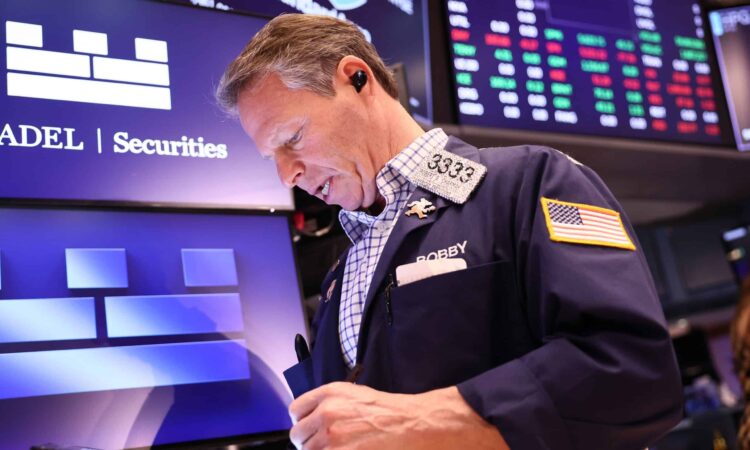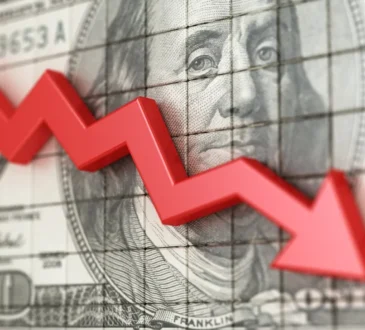
By
Joel South
Sep 26, 2025 | Updated 5:14 PM ET
This post may contain links from our sponsors and affiliates, and Flywheel Publishing may receive compensation for actions taken through them.
Key Points
- The Commerce Department issued its PCE report for August, showing small rises in core and total inflation.
- Personal income continues to rise slower than the prices for the things people buy.
These figures, if in line, should keep markets calm and support expectations that the Federal Reserve will stick to its projected 25 bps rate cuts, with swap markets pricing in roughly 40 bps of easing by year-end. Actual personal consumption expenditures are expected to grow 0.5% month-over-month, while personal income, which fuels that spending, is seen rising 0.3%—both slightly above prior estimates but suggesting consumers are still stretched as prices outpace income growth. Thursday’s upward Q2 GDP revision to 3.8% annualized adds a wrinkle, hinting at economic resilience that could temper the Fed’s urgency to cut rates further.
Actual personal consumption expenditures, meanwhile, grew 0.6%, while the personal income that makes those expenditures possible increased only 0.4%. Both numbers were slightly (0.1%) higher than predicted. Combined, they imply consumers continue to be stressed, with prices rising faster than incomes. Still, the changes weren’t large enough to cause great fear in the market, or upset expectations that the Federal Reserve will continue cutting interest rates (and boosting the stock market).
The Vanguard S&P 500 ETF (NYSEMKT: VOO) is up 0.3% premarket, signaling a cautiously optimistic open after three days of losses. S&P 500 futures are ticking up 0.2%, Dow futures add 0.3% (~140 points), and Nasdaq futures hover near flat (+0.1%). Trading volume appears subdued, with cyclicals showing early strength over defensives.
Tariffs News
Trump also unveiled a 25% tariff on imported “heavy” trucks (think semis, not pickups), a 50% tariff on kitchen cabinets and bathroom vanities, and a 30% tariff on upholstered furniture and select home goods. The truck tariffs could pinch logistics margins (1-2 pp hit), while furniture duties—70% of which come from Asia—may lift domestic producers but raise retail prices. Markets seem unfazed so far, betting on exemptions and U.S. production ramps to blunt the impact, though some analysts warn of 2-5% EPS risks for vulnerable sectors.
Key Focus Areas Today
- PCE Impact: In-line data could spark buying after the recent pullback; a hotter-than-expected report might dampen sentiment. Watch 10-year Treasury yields (4.2%) and the VIX (15) for clues.
- Earnings Watch: Costco (COST) reports Q4 FY2025 post-close, with consensus expecting $5.80 EPS and $86B revenue. Same-store sales and margins will be critical amid high valuations (~50x P/E).
- Sector Moves: Tech faces pressure from AI trade doubts (Oracle off 8% this week), but industrials like Boeing gain traction on FAA approvals. Cyclicals could shine if PCE aligns with forecasts.
Wall Street Upgrades
- Apple (NASDAQ: AAPL): Evercore ISI raised its price target to $290 from $260, maintaining an Outperform rating. A survey of nearly 4,000 U.S. consumers points to a stronger-than-expected iPhone refresh cycle, driven by robust Pro-tier demand and early iPhone 17 sales exceeding expectations. Analysts see Apple’s ecosystem strength fueling upside.
- Tesla (NASDAQ: TSLA): Deutsche Bank boosted its price target to $435 from $345, keeping a Buy rating, ahead of next week’s Q3 deliveries report (forecasting 461,500 units, above consensus of 433,000). Wedbush also lifted its target to $600 from $500 (Outperform), citing Tesla’s accelerating AI and autonomous driving push as a “game changer” for 2026.
- Oracle (NYSE: ORCL): Bernstein raised its price target to $364 from $363, holding an Outperform rating. Analysts expect Oracle’s revenue and profit growth to accelerate over the next few years, with strong free cash flow margins poised to rebound. Long-term, Oracle’s cloud and AI bets could make it “many times larger,” per Bernstein.
- Costco (NASDAQ: COST): Bernstein nudged its price target to $1,140 from $1,137, keeping an Outperform rating, despite Q4 same-store sales slightly missing expectations (5.7% vs. 5.9%). Membership fee income jumped 14% (7% ex-price hikes and FX), and U.S. traffic improved late in the quarter with extended hours. Morgan Stanley trimmed its target to $1,130 from $1,225 but maintained an Overweight rating, citing resilient membership growth.
- Morgan Stanley (NYSE: MS): Citi raised its price target to $155 from $130, holding a Neutral rating, as part of a Q3 earnings preview. Analysts anticipate a strong quarter, buoyed by a favorable market environment, with Morgan Stanley well-positioned to capitalize on investment banking and wealth management tailwinds.
The image featured for this article is © Photo by Michael M. Santiago/Getty Images




